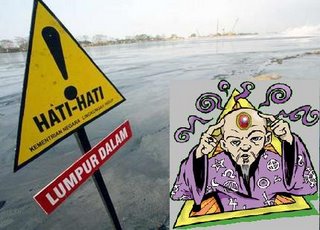Religion: Ritual vs. Spiritual Growth
Julia Suryakusuma, Jakarta
Remember my story about my cook, Sari (Chalk and Cheese, The Jakarta Post Aug. 8, 2006)? I also employ her husband, Didi. In the past he's been a builder, a farmer, a house-cleaner and a cook and so he is versatile and skilled at various jobs that need to be done around the house.
Didi is a nice guy, but he is also very diffident and shy. He has a debilitating awkwardness that he covers up by giggling. Whatever you say to him, he giggles, even if it is something that is absolutely not funny. If we said to him, "The police are coming to arrest you for a crime you didn't commit and will keep you in jail for life," his reaction would probably be to giggle nervously. He'd do same if we told him we were doubling his salary!
So Didi is a contradiction: a very competent worker who is an incompetent communicator. But this isn't his only contradiction. The other one relates to religion, which is why I call him 'the pious giggler'.
Didi follows Islam in a ritualistic way that is common in Indonesia and is very disciplined in doing so: praying five times, taking part in Koranic recitals, fasting and attending Friday prayers. He sticks closely to the rules of his religion and makes sure his family does the same, making his young children follow him in prayer and memorize key Koranic verses.
But despite his formal piety, he is chaotic, haphazard and often irresponsible in many other aspects of life -- especially those relating to his family. The most striking example of course, was Sari's recent unplanned pregnancy. He planted the seed of baby No. 4 because he was not disciplined enough to use any form of contraception (see Aborting the Abortion, The Jakarta Post, July 19, 2006).
Recently we bought a motorbike for Didi to take his kids to and from school and to perform household errands. I told him he had to have a driving license, but, giggling, he admitted he didn't even have any identity card (KTP), which, of course, every Indonesian must have and which is vital to one's existence in Jakarta. As it turned out, Didi's last KTP was from his village and expired in 1999! This meant he also lacked a family card and that therefore his kids didn't have birth certificates either. This could have serious long-term repercussions for them, making school, work, marriage etc virtually impossible. Didi also ran the risk of being caught in a KTP raid and thrown out of Jakarta.
I told him to get on the case, but after many months of no results, using a contact I had at the local subdistrict administration office, I helped him fix the mess instantly. Legitimately, no bribes, and all in one week.
Didi's lack of responsibility also extends to his behavior as a husband and father, often being unwilling to do things his wife asks of him, because of her pregnancy. And he gets stroppy and sulky when she's out too long, for example when she had to enroll all three kids into new schools on her own, because Didi thought this was woman's work.
Didi's behavior is a reflection of the gap -- sometimes huge -- between religious practice and private behavior so common in Indonesia today. The papers seem full of depressing stories of religious hypocrisy: a religious teacher rapes his student, a person who prays five times a day treats her servants inhumanely, or someone who diligently attends Koranic recitals consistently abuses people. National religious politics aren't immune either, with the former Minister of Religion, Said Agil al-Munawar being jailed this year for corruptly dealing with national haj funds entrusted to his care. Unfortunately, there are many other examples.
The gap between religious practice and reality is puzzling, considering that Islam (in this case) spells out guidelines for so many aspects of human life, both personal and social. Perhaps this is, in fact, part of the problem: too many Muslims understand religion to be merely ritual (ibadah) and jurisprudence (fiqh). In fact, the essence of religion should be spirituality, a personal understanding and connection with God, which develops from within, more than a set of do's and don'ts imposed from outside.
So, Didi's religiosity is largely formal and often doesn't connect with the practical realities of his obligations as a husband and father. But it would be wrong to think he is entirely without spirituality. His does have some other, very rare virtues: he is hardworking and, unlike our former minister of religion, he is also fiercely honest.
Indonesia is a bit like Didi, but -- sadly -- without his hardworking and honest aspects. As a nation, we are becoming preoccupied with religion, but it is formalistic, intolerant and hypocritical. Legislators at the local and national levels want laws to enforce sharia rules but seem unable to run the country responsibly. Islamist politicians want to introduce an anti-pornography bill when we already have laws banning dirty pictures, which are not enforced against the makers of an ocean of hard-core DVDs but are instead used to lock up young artists. Women are arrested for wearing lipstick in Tangerang and Playboy offices are sacked in Jakarta, while nobody seems to be able to do anything about the homeless in Yogya or cleaning up the horrific mudspill in Sidoarjo -- and there are still people in tents in Aceh!
We are using pseudo-religiosity as a substitute to facing up honestly to spiritually empty, frustrating lives, and a growing national failure of governance and a spiritually bankrupt national leadership.
Will our leaders ever borrow some virtues from Didi and honestly admit their failures and then do some hard work to make things better for the ordinary, poor Indonesians?
The wrier is the author of Sex, Power and Nation. She can be contacted at jsuryakusuma@mac.com.











